|
|
|
Sort Order |
|
|
|
Items / Page
|
|
|
|
|
|
|
| Srl | Item |
| 1 |
ID:
138289
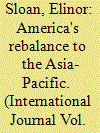

|
|
|
|
|
| Summary/Abstract |
This paper examines the impact of the US pivot to the Asia-Pacific on Canada’s strategic thinking and maritime posture. It highlights elements of the US rebalance before examining Canada’s recent past, present, and future strategic and military engagement. Canada wants to be able to contribute to crisis de-escalation if regional tensions lead to conflict, yet the Royal Canadian Navy has less deployment capacity today than it has had in 25 years. To contribute to mediatory influence, and provide warfighting capability, a recapitalized navy should increase deployments to the region, forward deploy some naval assets, and ensure interoperability with its US counterpart. In the event of a crisis, a choice might have to be made between a neutral, honest-broker stance and a more likely decision to contribute forces to a US-led coalition. The first step in either case is to be in the Asia-Pacific region with capable and credible naval forces.
|
|
|
|
|
|
|
|
|
|
|
|
|
|
|
|
| 2 |
ID:
110467
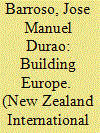

|
|
|
| 3 |
ID:
171877
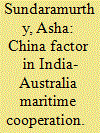

|
|
|
|
|
| Summary/Abstract |
The rise of China in recent decades has forged closer naval bilateral relationships in the Indo-Pacific region. Amongst these the Indo-Australian maritime ties have been a noteworthy development. Beijing's expanding maritime capabilities in the Indian Ocean Region and growing influence in the South China Sea have become a core convergence in Indo-Australian cooperation. China's approach of asserting its rise as friendly while simultaneously becoming more aggressive in boundary claims has increased security concerns for Australia and India, thereby prompting maritime security convergences through the AUSINDEX exercises, increased trilateral engagements and establishing a Quadrilateral Security Dialogue (QSD). However, the maritime convergence is not only based on hedging, as there are common views of maintaining an inclusive security framework with China to address non-traditional maritime security threats affecting the region. In examining the China factor, this article also draws in other players such as USA, Japan and the ASEAN states with stakes involved in the region as also influencing Indo-Australian relations in their considerations of China. This article will explore China as a strong point of interest in India-Australia maritime cooperation; the roots of which can be traced from 1991 and have culminated into synergies of collaboration.
|
|
|
|
|
|
|
|
|
|
|
|
|
|
|
|
| 4 |
ID:
123650
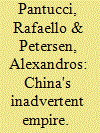

|
|
|
|
|
| Publication |
2012.
|
| Summary/Abstract |
PRESIDENT OBAMA'S late 2011 announcement of his administration's pivot to Asia marked a sea change in America's geopolitical posture away from Europe and the Middle East to Asia and the Pacific Rim. Reflecting the growing strategic repercussions of China's rise, the move presages a new era of great-power politics as the United States and China compete in Pacific waters. But is the United States looking in the right place?
|
|
|
|
|
|
|
|
|
|
|
|
|
|
|
|
| 5 |
ID:
122179
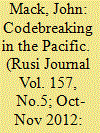

|
|
|
|
|
| Publication |
2012.
|
| Summary/Abstract |
The ability to decrypt Japanese naval codes in the Second World War was of great
importance to the Allied effort in the Pacific. However despite both the army and
navy using the same cipher system, a series of Japanese errors led to the naval codes being successfully attacked by codebreakers even before the start of hostilities. John Mack outlines the cryptographic system, and shows how the Imperial Japanese Navy's operational codes were broken through a combination of skill and blunder.
|
|
|
|
|
|
|
|
|
|
|
|
|
|
|
|
| 6 |
ID:
123516
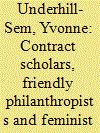

|
|
|
|
|
| Publication |
2012.
|
| Summary/Abstract |
Understanding new actors in development requires a reconsideration of how subjects come to be and how collectivities are formed. This paper works with post-structuralist notions of subjectivities and collectivities as 'series' in three distinct cultural historical geographies to show the subtle ambiguities in contemporary practices of development. Working with Iris Marion Young's conceptualisation of seriality, it provides an Antipodean perspective on the entanglements of contemporary critical geography with new development actors through case studies of indigenous scholars in Te Rarawa in Aotearoa/New Zealand, of contract scholars and a philanthropist in West Bengal and of feminist activist scholars in the Pacific. In doing so, it points to the need to radically rethink participation in development by closely analysing the ways in which the subjects are constituted, and the critical role of visions within development narratives, actions and practice.
|
|
|
|
|
|
|
|
|
|
|
|
|
|
|
|
| 7 |
ID:
121663
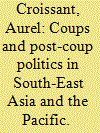

|
|
|
|
|
| Publication |
2013.
|
| Summary/Abstract |
The 2006 coups in Fiji and Thailand-as well as the 2012 incident in Papua New Guinea-have sent timely reminders that military coups remain a threat to vulnerable democracies in South-East Asia and the Pacific. This article explores the interplay between structural factors that can create coup risks, the 'coup-proofing' strategies of political leaders and the occurrence of military coups. While the article examines the region as a whole, it pays particular attention to Myanmar (Burma), Thailand, Indonesia, Fiji and Papua New Guinea. Borrowing from the work of Belkin and Schofer, it argues that the level of coup risk in each country can be assessed by analysing the extent of regime legitimacy, the strength of civil society and the frequency of military coups in the past. By combining this analysis with an evaluation of coup-proofing strategies, the study discusses likely scenarios for the five focus countries as far as the likelihood of coups or, alternatively, the establishment of stable civilian control is concerned.
|
|
|
|
|
|
|
|
|
|
|
|
|
|
|
|
| 8 |
ID:
121662
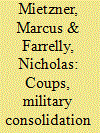

|
|
|
| 9 |
ID:
064563
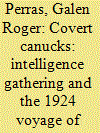

|
|
|
| 10 |
ID:
178065


|
|
|
|
|
| Summary/Abstract |
With China rapidly expanding its aid programme in the Pacific Islands region, there is a growing concern among established powers about China’s sway over the aid-dependent Pacific Island states. Systematic studies of China’s development finance to the small island countries are, however, rare and generally limited to mapping Chinese finance flows in the Pacific. This study seeks to contribute to the literature on China’s development efforts in the Pacific Islands region. Drawing on project-level data from AidData for the period 2000–2014, this paper disaggregates China’s official financing into its constituent parts and systematically explores the determinants of China’s Official Development Assistance (ODA) and its commercially-oriented finance flows to the Pacific. The panel data analysis finds that, contrary to popular belief, China does not reward voting compliance in the United Nations nor is its allocation of financing to the Pacific influenced by the countries’ level of indebtedness.
|
|
|
|
|
|
|
|
|
|
|
|
|
|
|
|
| 11 |
ID:
071920
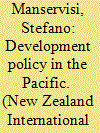

|
|
|
| 12 |
ID:
187016


|
|
|
|
|
| Summary/Abstract |
Much scholarly attention has been paid to the issue of climate change in the Pacific Islands, in terms of its geopolitical implications, and through the lens of mitigation and adaptation policies and strategies. Comparatively little focus has been given to the domestic politics of climate change in the region: How a changing climate is affecting internal political dynamics. This article traces the boundaries of a new research agenda on the impacts of climate change within Pacific states as an animating political dynamic. It considers climate change as a possible source of political change and contestation; as a critical domestic policy issue; and as a driver of political participation and organisation. Climate change is an existential threat to the Pacific Islands, yet it has unique power as a mass mobilising factor in the largely localised and fragmented politics of the region. We conclude with some reflections on the potential of climate change as a key political driver in the region, and fruitful avenues for future research.
|
|
|
|
|
|
|
|
|
|
|
|
|
|
|
|
| 13 |
ID:
124864


|
|
|
|
|
| Publication |
2013.
|
| Summary/Abstract |
An objective assessment reveals that India, simply because it is a democracy, will be no less likely than China as a rising power to pose significant challenges to U.S. interests. While Washington has basically gotten its China policy right, a new approach to India is needed.
|
|
|
|
|
|
|
|
|
|
|
|
|
|
|
|
| 14 |
ID:
103957
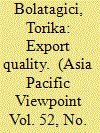

|
|
|
|
|
| Publication |
2011.
|
| Summary/Abstract |
Fijian bodies have become a valuable commodity in the economy of war. Remittances from workers overseas are Fiji's largest income - exceeding that of tourism and sugar export. This essay examines historical and contemporary representations of the black male body that perpetuate the exploitation of Fijians by inscribing the Fijian male body as warrior, criminal and protector. Taking a multidisciplinary approach informed by sociology, cultural theory, Pacific studies, visual culture, feminist and post-colonial theory, my practice is the vehicle through which I address issues of neocolonial commodification of Fijian bodies. Through an analysis of my own staged photographs and vernacular images taken by Fijians working for private security military companies and British and US armies, I hope to challenge audiences to consider their own perceptions of Fijian agency and subjectivity. By theorising the politicisation of the black body and interrogating colonial representations of blackness, I argue that we can begin to create links between the historical and contemporary exploitation of Fijians and that at the essence of both is an underlying racial hierarchy and economic requirement for cheap and, arguably, expendable labour.
|
|
|
|
|
|
|
|
|
|
|
|
|
|
|
|
| 15 |
ID:
187018
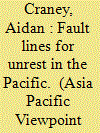

|
|
|
|
|
| Summary/Abstract |
Instances of civil unrest and disorder have pockmarked the mainly peaceful functioning of multiple Pacific states in recent decades. This paper examines factors which can be seen as fault lines for predicting and mitigating such unrest, with a particular focus on Fiji and Solomon Islands. Drawing on data collected through interviews with youth advocates and activists, it becomes clear that the common justification of ‘ethnic tensions’ for past unrest and fears of future unrest being necessitated by a ‘youth bulge’ oversimplifies the complexity of factors that lead to disorder. Issues of land rights, uncertain livelihood futures and public perceptions of inequality provide more salient framings for understanding why citizens engage in unrest. Indeed, it is perceptions of injustice and inequality which may well prove to be the greater indicator of the likelihood of any future destabilisation.
|
|
|
|
|
|
|
|
|
|
|
|
|
|
|
|
| 16 |
ID:
180404
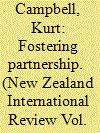

|
|
|
|
|
| Summary/Abstract |
The Pacific will be the dominant international arena in the 21st century. The United States' goal in dealing with an increasingly complex region will be to preserve the operating system that has allowed massive development in the region over the last five decades. It is a region that faces major challenges and its response will be critical to dealing effectively with the existential threat posed by climate change and other transnational threats. Before addressing these problems, the Biden administration is focused initial on domestic concerns, restoring the economy and healing divisions, but it values bilateral relations with likeminded states like New Zealand.
|
|
|
|
|
|
|
|
|
|
|
|
|
|
|
|
| 17 |
ID:
127695
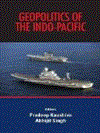

|
|
|
|
|
| Publication |
New Delhi, KW Publishers Pvt Ltd and NMF, 2014.
|
| Description |
xix, 138p.Hbk
|
| Standard Number |
9789383649099
|
|
|
|
|
|
|
|
|
|
|
|
Copies: C:2/I:0,R:0,Q:0
Circulation
| Accession# | Call# | Current Location | Status | Policy | Location |
| 057569 | 320.95401823/KAU 057569 | Main | On Shelf | General | |
| 057610 | 320.95401823/KAU 057610 | Main | On Shelf | General | |
|
|
|
|
| 18 |
ID:
186104


|
|
|
|
|
| Summary/Abstract |
Since 2006, 50 Cuban doctors have worked in Pacific Island countries (PICs), while 250 Pacific islanders have studied medicine at the Latin American School of Medicine in Cuba, nearly doubling the medical workforce in some countries. Although Cuba has pursued an extensive South-South Cooperation (SSC) programme in health around the globe for 60 years, the relatively recent presence of Cuba in the Pacific is intriguing. The programme is based on what Cuba has called the “multiple coincidences” and shared experiences between Cuba and PICs as Small Island Developing States facing common challenges. Proponents argue Cuba’s expertise in providing community-based and human-capital oriented care health care in low-resource environments could provide a suitable model for meeting the health goals and needs of PICs. Moreover, Cuba’s medical cooperation is grounded in an ethics of solidarity and offers a clear example of social justice-oriented south-south cooperation which aims to both address immediate humanitarian need and to transform power structures that limit the accessibility and availability of sustainable health care within partner countries. Yet despite this there has been little research on Cuba’s approach to medical cooperation in the Pacific. This paper addresses this gap, drawing on Maussian gift theory to argue that the Cuban ‘gift of health’ provides much needed capacity in health while building the dignity of both partners. As a theory of solidarity with distinct Pacific roots and which links clearly to the solidarity-based model of Cuban cooperation based on egalitarianism and relationship, gift theory provides an explanation for the presence of Cuba in the Pacific and highlights the importance of equitable relationships and dignity in development partnerships, providing theoretical roots to the idea that there might an alternative to traditional models of aid and development in the region.
|
|
|
|
|
|
|
|
|
|
|
|
|
|
|
|
| 19 |
ID:
187654
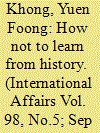

|
|
|
|
|
| Summary/Abstract |
This article attempts to answer two questions. First, what are the relevant ‘how not tos’ when it comes to learning from history? I argue that from existing accounts of how policy-makers (mis)learn the lessons of history, we can derive four ‘how not tos’: 1) do not settle or fixate on the first, or most ‘available’ or ‘representative’ analogy; 2) do not dismiss differences between your favoured analogy and the case in question; 3) do not neglect alternative analogies; and 4) do not shirk from ‘testing’ the observable implications of your preferred analogy. Second, do policy-makers show awareness of these ‘how not tos’ as they use historical analogies? An examination of how they are using the Cold War analogy to interpret the nature and trajectory of contemporary US–China relations suggest that they seem to have avoided the worst pitfalls of analogical reasoning in foreign affairs. The most prominent users of these historical analogies show awareness of the first three of the above proscriptions; all, however, shy away from the fourth proscription—testing the prognostications of their favoured analogy. Although this is far from perfect, the signs point to the Cold War analogy being used in ways that avoid the general pattern of superficial and poor use documented in existing analyses of analogical reasoning in foreign affairs.
|
|
|
|
|
|
|
|
|
|
|
|
|
|
|
|
| 20 |
ID:
123675
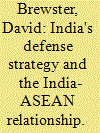

|
|
|
|
|
| Publication |
2013.
|
| Summary/Abstract |
India's defense strategy toward Southeast Asia can be understood in terms of two broad sets of strategic objectives that together drive India's relationships in the region. These include its ambitions to be the predominant power in the northeast Indian Ocean and a broader objective to assume a greater strategic role in Southeast Asia and the Pacific. India's aspirations to increase its defense presence in the region are broadly consistent with the perspectives of many ASEAN states, which mostly see India as a positive factor in the Southeast Asian balance of power. But India is yet to demonstrate itself as a useful and consistent security partner for much of the region. India is hindered by a lack of strategic focus and planning that is consistent with many of its strategic relationships.
|
|
|
|
|
|
|
|
|
|
|
|
|
|
|
|
|
|
|
|
|